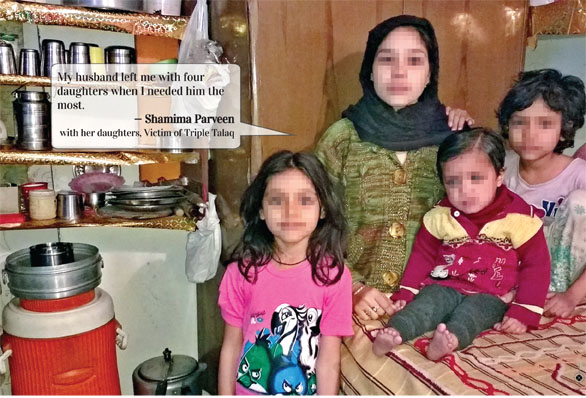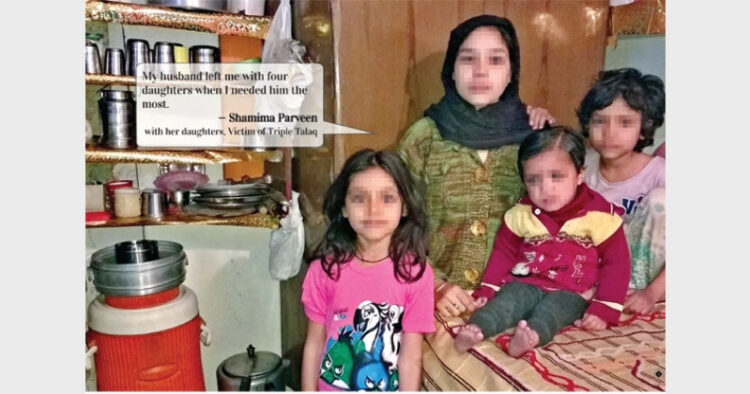 Victims of Veil
Victims of Veil
“He divorced me because I failed to give him a son”, said 31-year-old Shamima Parveen (name changed) when asked, why she got divorced? A curious mix of
patriarchal mindset covered under Personal Laws. Shamima is not the only Muslim woman who has suffered due to practice of ‘triple talaq’ and speaks openly against this ill-practice. There are lakhs of Shamimas who have been lately feeling emboldened to express their pain and agony due to it, and to bring to light the atrocities perpetrated on them. Here is an attempt to give voice to some of the voiceless:
Nishant Kr Azad
31 years ago, Shah Bano, wife of a lawyer Mohd Ahmed Khan, dared to challenge him in court of law for denying
maintenance and then according Triple Talaq unilaterally. As the then Rajiv Gandhi-led Congress Government chose to succumb under pressure of religious mobilisation and upheld the religious laws in the name of ‘secularism’. After the Constitutional amendment to protect the Personal Laws, the status-quo is maintained all over. The only change is unlike during the Shah Bano case, many Muslim women are openly speaking openly for their marital rights and movements like Bharatiya Muslim Mahila Andolan (BMMA) are standing behind them. A person like Tufail Ahmad is presenting a draft on Uniform Civil Code. In such as scenario, it is pertinent to listen to women who face the consequences of this issue of Gender Discrimination
suppressed under the manufactured debate of secular versus communal.
Shamima Parveen, Age: 31 Years
“He divorced me because I failed to give him a son”, said 31-year-old Shamima (name changed) when asked, why she was divorced? In 2003, Shamima got married to Shahid. Later the couple got blessed with a baby girl and from that moment her life took a turn for worse. Year after year she continued to conceive to fulfill the dream of Shahid and his family but she failed. Finally the day came when she got punishment for the fault of not providing a son. And the punishment was Talaq, talaq, talaq…
“I gave birth to four daughters. My fourth daughter was born with a serious lips problem which required surgery. And that surgery needed lot of money. He left me with my four daughters when I needed him the most”, she narrated. Her eyes filled with tears while narrating the pain.
My mother in law told to me, “You have done wrong karma because of this you have four daughters without any son.”
At present, she is living in a tiny room of congested hutment area of Tigri in Sangam Vihar on outskirts of Delhi, with her four daughters in a very critical situation. On being asked what she does for the survival, she said “I sell momos for survival of my daughters and to support myself. Large part of my income (whatever I earn) spends on my fourth daughter who is still recovering from lip surgery. I can’t do any permanent job because there is nobody to take care of my daughters.” She is still in hope that someday her husband will come and take her home with her daughters. “I don’t want this divorce. I don’t want to leave my husband and still in hope that everything will be alright. I am ready to forget what he and his family did to me”, she said.
On asking, what is her opinion over ‘triple talaq’, she replied, “I am against the practice of triple talaq and it should be banned. This is totally injustice to women. Who gave right to a man to spoil a woman’s life?
The narrow and smelly lanes of Tigri not only tell the story of pitiable condition of a colony but also the poor patriarchal mindset of many living in the society, whose minds are narrower than the Tigri lanes. Triple talaq, a practice that allows Muslim men to divorce their wives has ruined lives of many Indian Muslim women.
Noorjahan, Age: 24 Years
Noorjahan (name changed), a young 24-year-old woman got married in 2013. Few days after marriage, Gulzar
(husband) started being violent. Noorjahan explained how her life became hell just after marriage and how she tolerated the things. “Gulzar’s family used to abuse me. Even his younger brother used to beat me sometimes. They used to say, ‘It was their bad luck that his son got married to me.’ I still remember it was the holy month of Ramazan. I was offering namaz. The moment I finished namaz, Gulzar started beating me without any reason. Whenever I had a conversation to my Ammi (mother) and Abbu (father) over phone, they used to abuse me. I was alleged being a
characterless and always talking to some other men. They broke my phone also.”
“After marriage I was in Bareilly, one day he took me to Delhi. When I asked him, why we are shifting to Delhi, he replied, we will not live in Bareilly anymore. Everything was ok in Delhi for few days but again he started scolding me. Without taking me with him, he left for Bareilly, with a promise to return in few days, but never returned back.”
“One day he told me that I am giving you talaq. My father works in a boutique. He gave everything to my in-laws at the time of marriage as dowry but that was not enough for them. My father took a hefty loan for my marriage and still paying the interests. I am the elder one having three younger sisters. Whenever he sees me he just gets upset. We have filed a case against my husband but nothing is going in favour of me. Whatever my father earns, he pays to the lawyers to fight the case. Due to our tight financial condition, we have not been able to follow up the case properly. I literally begged my husband many times and said, just don’t throw me out of his life but he don’t want to be with me”, Noorejahan told.
The surprising thing which the writer witnessed while visiting the victims of triple talaq was that two sisters who got married in 2013 and got divorced a year later refused to talk and give details of divorce because of family pressure. The male member of the family said, “This is our personal matter and both the girls got divorced as per Sharia Laws”, while watching an item number on television, which is also Haraam (un-islamic) as per Sharia Laws.
Aliya Khatoon, Age: 30 Years
Another victim, Aliya, a 30-year-old woman told Organiser, “I got married in 2005 and he divorced me in 2007. He used to drink regularly. Once he came at night and started beating me and said talaq talaq talaq. I thought he is drunk that’s why he is saying all this. But next day, he said, “I mean what I said to you last night”. He left me and my daughter. One day I came to know that he got married again. Presently I am living with my brothers. Still I am not able to understand, why he left me?”
You move around any Muslim dominated locality and you will find a number of such cases. The resentment among Muslim women about this gender discrimination is obvious. In 2015, a national study released by the BMMA, found that more than 90 per cent Muslim women want triple talaq to be abolished. The organisation also sent a petition on this matter to the National Commission for Women (NCW), which was signed by 50,000 people. The study also revealed that the vast majority of the divorced women received no compensation.
Last year, NCW demanded a ban on triple talaq and polygamy in its affidavit to Supreme Court on the grounds that these practices are against the rights of Muslim women. The government at Centre has also opposed the practice of triple talaq, nikah halala & polygamy and favoured a relook on grounds of gender equality.
“My husband was having an illicit affair so he used triple talaq to get rid of me. I don”t want him back. I just want a complete ban on triple talaq and polygamy,” is the feeling of
35-year-old Fatima.
In 2005, she got married to her paternal cousin. A year later Fatima came to know that her husband was having an affair with a woman who was working with him. She objected and in return she was tortured & abused. Finally one day, she got divorced. But she decided that she will fight for her right. She slapped a case of domestic violence against her husband. When her legal fight began to pick up, she got fatwas which stated that her talaq is valid and she has no right to file a case against her husband.
Another woman Zazia says on the issue of triple talaq, “Jyadatar Musalman mard aurato ko pair ki juti samajhte hai (Most of the Muslim men consider women to be
subservient to them). We have male-dominated religious authorities who call themselves custodians of Islam, but the fact is that nobody cares for right of women in Islam.”
This is not only the story of five or six woman; there are lakhs of Muslim women who has suffered due to triple talaq. India is one of the few countries that recognises triple talaq. By meeting these women one can simply understand that it is high time for Muslim women to know that triple talaq is a practice that needs to be fought against.
On the issue of triple talaq, Advocate-on-Record in Supreme Court Sanjay Visen opines, “Triple talaq is a clear cut case of violation of the rights of Muslim women. The right to religious freedom applies equally to women and men. It nowhere gives the permission to a man to oppress woman. Muslim bodies and the higher authorities of this country have to seriously think about this. Practices of triple talaq and polygamy should be re examined.”
The failure of Muslim religious clergy to address the issue from a women’s perspective is also a major problem. Time has come for Muslim women to come altogether and raise voice against these practices for the welfare of their coming generations. The interests of women, in the dual legal structure of ‘secular laws’ and ‘personal laws’, are vulnerable to exploitation by alliance of religious and patriarchal interests. Women”s rights activists in India have long been protesting against the gender-discriminatory nature of the Personal Laws of all religious communities. All reformations, including that of Hindu Marriage or Succession Laws met with some resistance, but not in the name of secularism. The irony is the gender issue is pushed under the carpet in the name of ‘secularism’, interpreted as protection to separate Personal Laws to minority groups. In reality, it negates the true nature of ‘secular’ laws. The pain of Shamima, Shayara, Shah Bano or Zazia is not religious but of a woman, who has no role in articulating her
marital rights. If we really want to give them a voice, the issue is to be placed in gender discourse rather than secular
versus communal debate. Then only we can reignite the Shah Bano moment in the changed context.













Comments